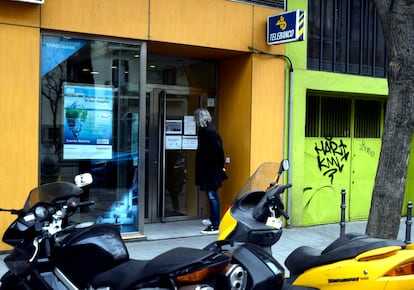Spain prepares fresh economic relief for the self-employed
With the economy in slow motion, small businesses may soon benefit from extended deadlines on social security payment obligations

Faced with a chorus of requests for more measures to deal with the economic effects of the coronavirus crisis, the Spanish government is now considering a moratorium on social security contributions by self-employed workers and some small- and medium-sized businesses (SMEs).
Government sources said that the Economy Ministry has approved the initiative and that the ball is now in the court of Social Security Minister José Luis Escrivá, who is crunching numbers to determine how much revenue the welfare system can afford to put on hold. The figures will be reviewed by the Cabinet at its weekly meeting on Tuesday and could secure fast-track approval.
Business activity in Spain has slowed down dramatically since the government introduced confinement measures on March 14 in a bid to curb the spread of the coronavirus. As Spain became one of the world’s hardest-hit countries, two more weeks of even stricter conditions were announced on Sunday, suspending all non-essential activity. Experts estimate that the cost to the economy of the four-week hiatus could be in the range of €49 billion.
The government will also consider a moratorium on mortgage payments for business premises
Earlier this month, Prime Minister Pedro Sánchez of the Socialist Party (PSOE) announced a €200 billion relief package with measures that included delaying mortgage payments, easing social security contributions and allowing employees who need to care for dependents to reduce their workday by as much as 100%.
The government also introduced measures to facilitate the use of temporary layoff plans known as ERTEs and restricted employers’ ability to fire employees for the entire duration of the coronavirus crisis.
The new initiatives under consideration are part of a fresh set of relief measures for citizens and businesses struggling to meet their obligations.
Small businesses
Self-employed workers and SMEs have been particularly hard hit by the loss of income triggered by the prolonged shelter-in-place orders, and the Social Security Ministry is now considering who could be eligible for extended payment deadlines for welfare system contributions. A business is generally considered to be an SME if it has fewer than 250 employees, but government sources said the cut-off point for eligibility will probably be lower in this case.
For now, the Sánchez administration has offered a deferral on tax payments up to a maximum of €30,000 as well as a €20 billion guarantee scheme to ensure liquidity for companies, which could be expanded to €100 billion. It has also greenlighted aid for self-employed workers whose activity has ceased entirely or whose revenues drop by 70% or more from the previous six-month period as a result of the lockdown measures.
At the Cabinet meeting on Tuesday, the government will also consider a moratorium on mortgage payments for business premises. Government sources said that it would work a lot like the delayed mortgage payment program for social groups at risk of losing their homes.
The government is also expected to discuss new measures to help struggling tenants pay their rent, as well as financial relief for temporary workers who are currently ineligible for unemployment benefits.
English version by Susana Urra.
Tu suscripción se está usando en otro dispositivo
¿Quieres añadir otro usuario a tu suscripción?
Si continúas leyendo en este dispositivo, no se podrá leer en el otro.
FlechaTu suscripción se está usando en otro dispositivo y solo puedes acceder a EL PAÍS desde un dispositivo a la vez.
Si quieres compartir tu cuenta, cambia tu suscripción a la modalidad Premium, así podrás añadir otro usuario. Cada uno accederá con su propia cuenta de email, lo que os permitirá personalizar vuestra experiencia en EL PAÍS.
¿Tienes una suscripción de empresa? Accede aquí para contratar más cuentas.
En el caso de no saber quién está usando tu cuenta, te recomendamos cambiar tu contraseña aquí.
Si decides continuar compartiendo tu cuenta, este mensaje se mostrará en tu dispositivo y en el de la otra persona que está usando tu cuenta de forma indefinida, afectando a tu experiencia de lectura. Puedes consultar aquí los términos y condiciones de la suscripción digital.








































